Malawi Has an Ocean!
We did not know a country named Malawi existed until we started planning our trip to Africa. As soon as we saw a picture of this nation, we knew we needed to make it there. If you look closely in a map, you could find this small country right in the south center of the continent. Malawi doesn’t have a coast, but instead has a huge, gorgeous lake that feels just like the Caribbean Ocean! The beach, the waves, the colorful fish, and the immensity of its blue waters extending until the end of the horizon will make you believe you are there.
Between January 5 and January 25, 2014, we traveled along the shores of Lake Malawi. Traveling overland we made our way to Cape Maclear and Monkey Bay in the south. By ferry, we reached Likoma island and Nkhata Bay in the East and West sides of the lake, respectively. Cape Maclear is a fantastic location to enjoy the lake and the community living by it. A walk along the beach is an opportunity to see the happiness of children playing in the water while their mothers are washing clothes and kitchen utensils.
Kids Playing in the Water
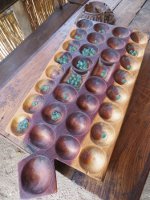
We spent our days camping, learning how to play a local game, bao, and food tasting around the different little restaurants around the village. We love their freshly cooked dishes: kampango fish, beans, and nsima (cook maize flour). Cape Maclear offers multiple accommodation and restaurant options, with the most affordable prices in comparison with other places we visited around the lake. Cape Maclear also has a National Park with hills to hike and underwater life to discover.
We completed our first freshwater dive at Thumbi Island, which is in the middle of the Cape Maclear bay. This has been the most relaxed and mellow dive we have ever done: 50 minutes of peace, swimming at 12-meter depth without current between the native and unique colorful fish of Lake Malawi. In the evening, the spectacular sunsets by the beach and the sounds of the waves in the background were the best setting to appreciate the ending of another wonderful day by the lake.
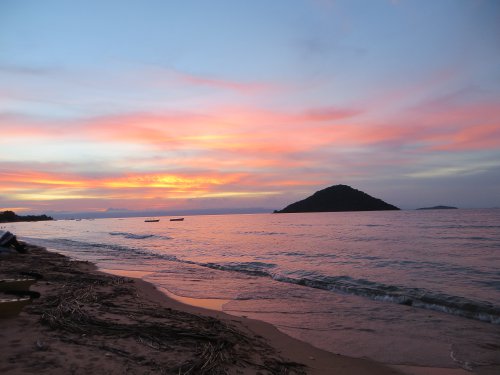
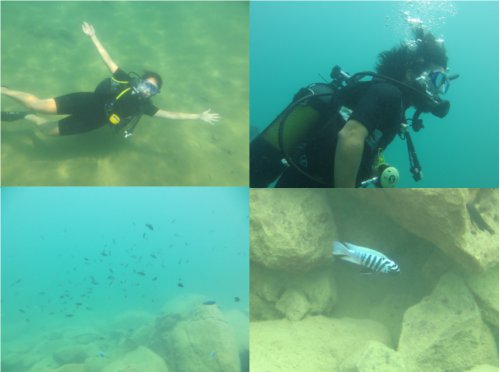
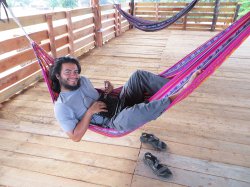
From Cape Maclear we traveled on a matola, a pick-up truck, taking multiple people and luggage to Monkey Bay. Here we rested on hammocks by the lake and made arrangements for our next destination. We traveled from Monkey Bay to Likoma Island in the once-a-week route of the Ilala Ferry. During the 25-hour trip, the boat made stops at different towns by the lake offering nice views of the coasts line in Mozambique and Malawi territories.
We booked first class tickets as recommended by our travel guide. These seats were located on an open deck with a partial roof that hosted a bar, which was a great location during the day, but at night the sleeping conditions of the “first class” became the joke of the experience because we were only offered the floor or the wood benches to sleep on. We were able to rent a thin hay mat to lie down on the floor. We covered ourselves with our clothes to resist the cool breeze and changed positions every once in a while when our body would get numb. We didn’t have the best sleep and woke up early to return the mat because the person renting it was getting off at the first morning stop in the Mozambique border.
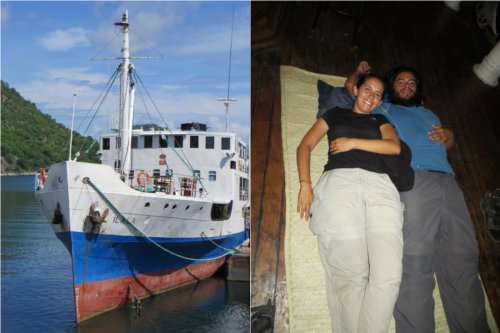
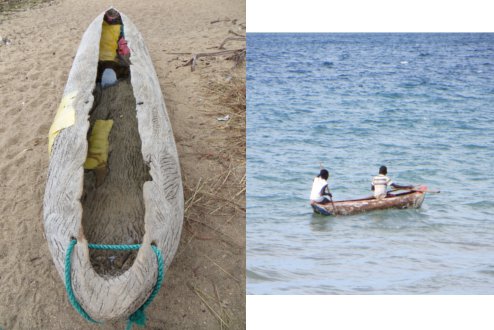
When we arrived at Likoma Island we were surprised by the difference of the landscape. Lower bushes were enhanced by giant baobab trees standing all over the island. All the local houses were surrounded with promising crops of corn, cassava, and mango trees full of sweet yellow temptations. As we passed by small villages we got to see the women carrying heavy things on their heads and keeping a perfectly balance walk. We enjoyed camping at a peaceful beach by the lake during the low season of tourism. The crystalline waters were a great scenario for a free diving lesson and amateur underwater photography. Every night the local fishermen tried their luck on their traditional canoes. We also enjoyed a few hour-hike to the highest point on the island that rewarded us with a view of the bay where we were enjoying our days.
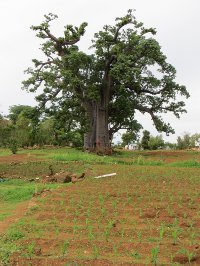
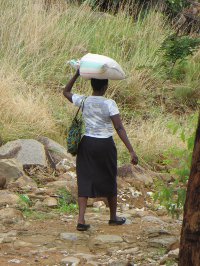
We left Likoma Island on a rainy day and strong waves. The ride that was expected to be no longer than four hours lasted six. On our way to Nkhata Bay, the boat made a stop at Chizumulu Island and delivered the first car in the territory. The reception of the vehicle was full of curiosity and celebration by the local people. We will always remember the scene of children screaming and running behind the car as it was making his way along the beach. We witnessed this historical moment with mixed feelings: a sacred piece of land in the world may have improvements, but after 2014 it will no longer escape the tentacles of “development”. We saw a reflection of humanity in the naive and joyful welcoming of the locals to the first car in the island. Just like them, for decades, we have been embracing with unquestionable excitement the advances of technology, regardless of how much they continue affecting our lives and the environment without a clear future.
In Nkhata Bay, we had the opportunity to get involved with the Malawian community living by the lake. We stayed at a unique backpackers lodge and charity with multiple social projects to inspire. We were given a double room with a spectacular lake view. We decided to stay longer to participate in their groups and learn from their years of leadership. If you are interested in learning more about this experience, you should not miss our article. During our time in Nkhata Bay, we explored the center of town and some of the beautiful beaches by the lake. Everywhere we went, the smiles and kindness of the Malawian people brought us happiness. The delicious avocados in season were a perfect snack to enjoy and indulge!
Just few days before we left Lake Malawi, we found out about the existing interest of a British oil company and the Malawian government to start petroleum explorations in the north of the lake. This scary and detrimental news could be the end of Malawi’s paradise and their communities. Our love for this beautiful fresh water “ocean” hopes that the battle against this multimillionaire interest can be defeated, so that this piece of heaven on earth could preserve its magic forever.
